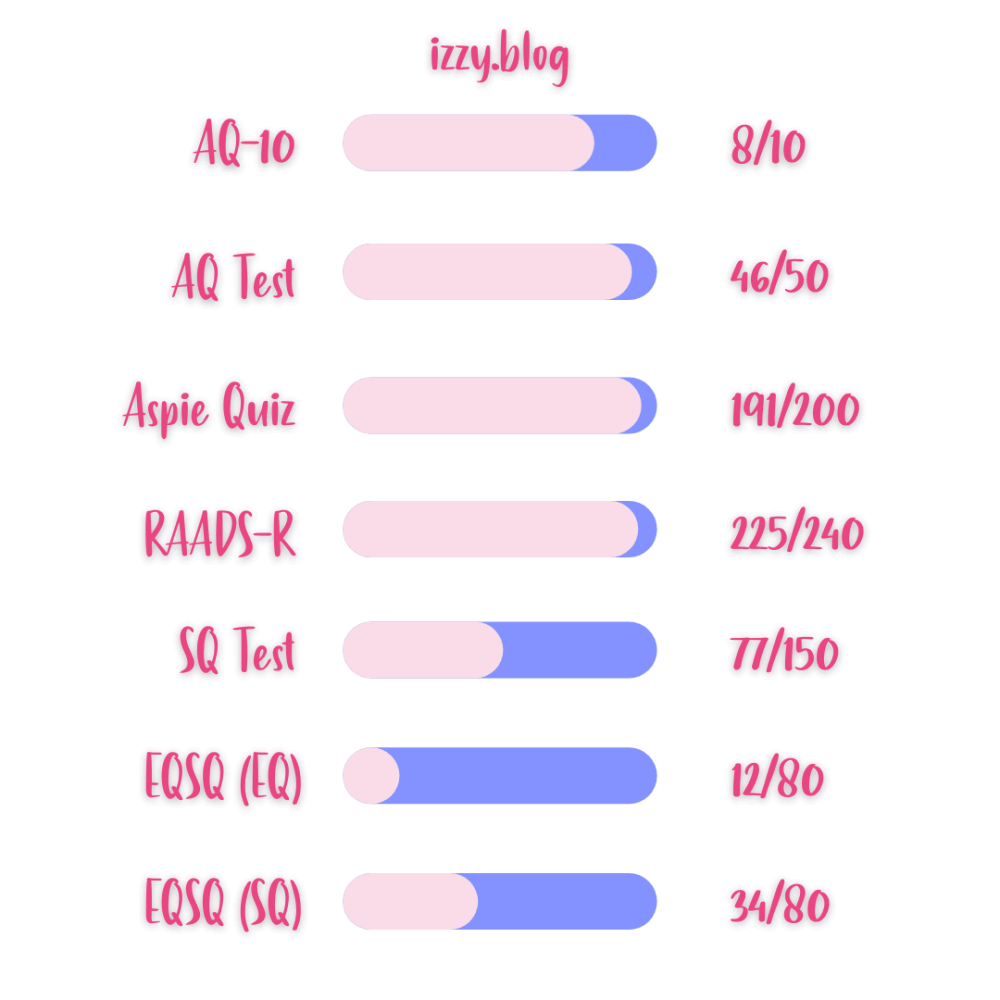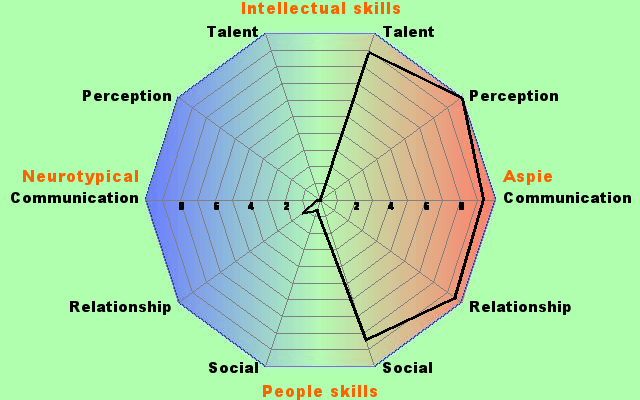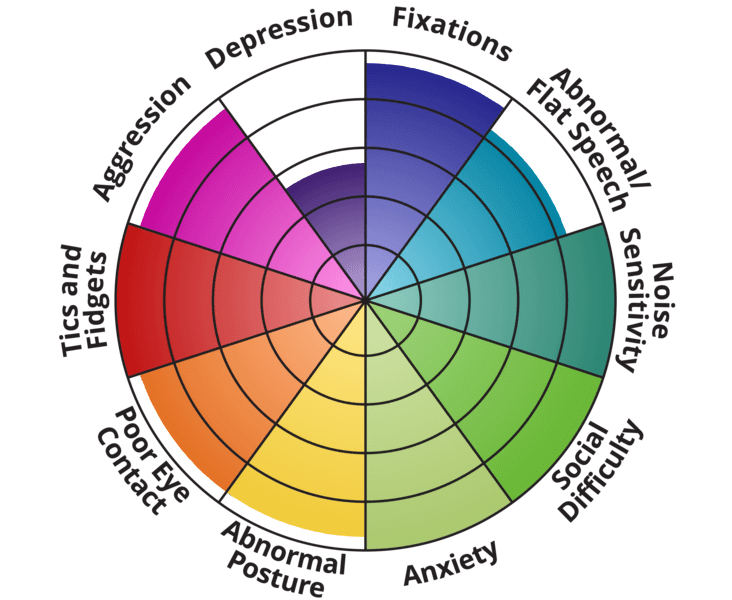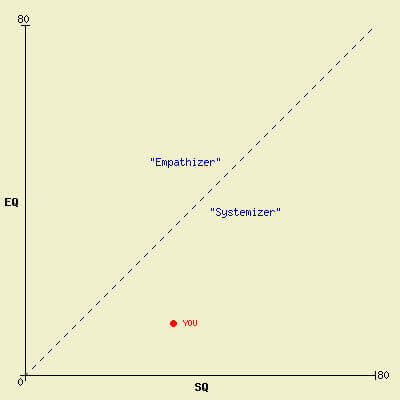On this page, I host the results for autism quizzes and tests I’ve taken.
Are online autism tests accurate?
This question’s often asked by non-autistic people who presume autistic people are using online autism tests to diagnose themselves.
Meanwhile, autistic people talk about online autism assessments in quite a different way. (Here’s the list of online autism quizzes!)
The quick, real answer:
It’s complicated.
The autism assessment process is oftentimes a series of these “online autism tests” printed out and served.
Because guess what! The autism tests on the internet — the ones with names that have gained some semblance of popularity over the years — were created for diagnostic purposes!
Unlike my autistic burnout quiz, random website owners did not simply decide to create an autism test to see who might take it seriously. 🙄
The quick, simple answer
Online autism quizzes and tests may be helpful to people who think they might be autistic.
People who DON’T think they’re autistic don’t spend 1-5 hours taking online autism assessments to see if they might be autistic or neurodivergent in general.
And if they do? It’s not hard. It’s simple. The tests are reportedly difficult for autistic people. It’s like you’re having to take a test you didn’t study for — and also didn’t get the lesson for!
While non-autistic professionals are hesitant to diagnose autism, especially in adults, these quizzes and tests may serve as precursors to an official autism diagnosis.
Until an official autism diagnosis, online autism questionnaires can help validate research done by people who suspect they may be autistic, which may provide answers and understanding where there wasn’t any before.
Online autism quizzes + tests I took
It’s been eight years since I last did an online autism quiz, and many have cropped up since then. What a wonderful time to take them all and share my answers.~

AQ-10
This test is a PDF, so the link may automatically download in your browser. Proceed with caution.
I scored an 8/10.
AQ Test
by Psychology Tools.
I scored 46/50.
Aspie Quiz
I last took the Aspie Quiz and shared my results in 2014, when I scored 180/200 autistic and 28/200 neurotypical.
My new score: 191/200 autistic, 10/200 neurotypical. Does this mean I leveled up in autism??

I didn’t share my last results PDF, but if you’re curious, you can download and read more about it this time.~
Autism Spectrum Test
The Autism Spectrum Test by IDR Labs is clinically-oriented and was made professionals who work in psychology and research.
With your results, you get a beautiful spectrum chart of your autism — for free!

This test is one of the more popular ones because it illustrates where an individual may fall on the autism spectrum specifically.
My results are a bit more “extreme” than what I see elsewhere. I do find I score in the higher ranges on autism assessments, tests and quizzes. This is probably due to autistic burnout, as I’m unable to mask like I used to.
RAADS-R Test
When I saw this test on TikTok, I had to search for it. Embrace Autism is a site that has been trending on #autistiktok, so I shouldn’t have been surprised to see it hosted there.
I scored 225/240.
I don’t know what these numbers mean:
- Social relatedness: 111
- Language: 21
- Sensory/motor: 53
- Circumscribed interests: 40
EQ Test
This 45-minute Emotional Intelligence Test by Psychology Today is free to take, but if you want more than a summary evaluation and graph, you’ll have to fork over $9.95
If you can put up with 146 questions, it might be worth it.
I gave up at number 111, because I was sick of the what should so-and-so do? and what would you do? questions. I don’t know. WHY ISN’T THERE AN “I DON’T KNOW” OPTION?!
Reminded me of my shitty high school therapist who couldn’t quit focusing on hypotheticals, and this much stress for a fun, explorational activity wasn’t what my mental health needed.
SQ Test
The Systemising Quotient (SQ) Test available via Aspie Tests is 75 questions long and nothing like the awful Psychology Today EQ Test.
I scored a 77/150, which is the average score for autistic females.
EQSQ
This test is problematic because Baron-Cohen research is anti-autistic and has contributed to a lot of harm towards autistic people.
The Empathizing-Systemizing Test consists of 120 statements containing proper multiple choice options — Strongly disagree, Disagree, Agree, Strongly agree — and may go smoother if the PT one was too much.

I know it did for me.~ Even though I got a rude graph.
I scored a 12/80 Empathizing Quotient and 34/80 Systemizing Quotient.
According to Baron-Cohen’s 2003 book, I have a lower than average ability for understanding how other feel and responding appropriately, and an average ability for analyzing and exploring a system.
Considering a lot of questions were about how everyday things function, I’m sure “a system” isn’t a dissociative identity disorder reference.
Personality tests geared towards neurodivergent people always interest me, but the ones without neurodivergence in mind leave no room for such individuals.
I prefer these kinds of tests, since they help me understand more about myself with respect to how my brain works.
What do you make of personality tests and quizzes?
Did you take the autism ones?
If so, what were your results?
And — if you’re comfortable doing so — does your professional diagnosis and/or suspicions match your results?